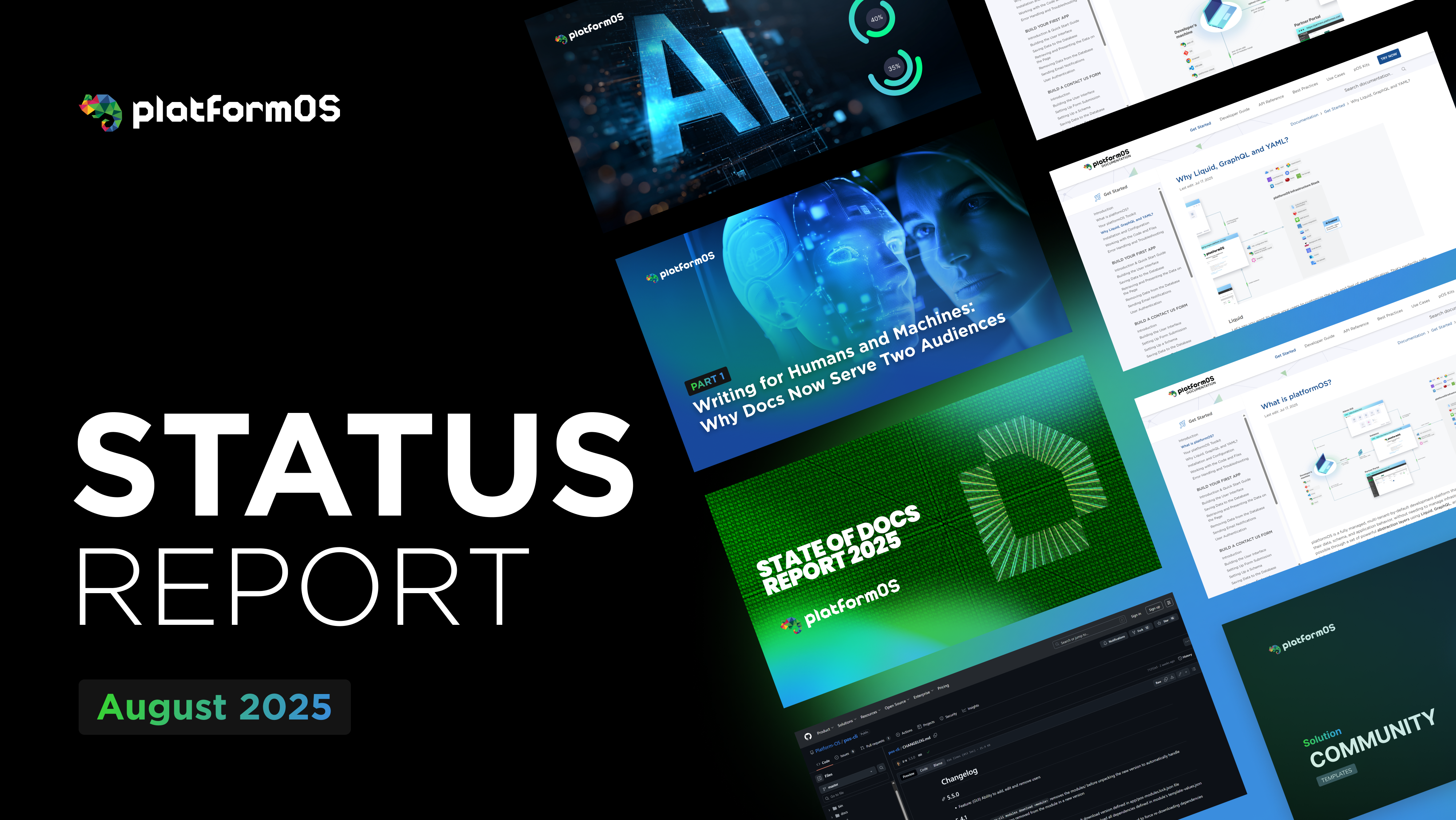





Our team has been actively sharing updates, industry perspectives, and strategic insights through new publications covering innovation, AI, sustainability, and business strategy:
Reflecting on theNTWK Ecosystem Summit 2025
Highlights from our participation in Barcelona’s flagship ecosystem event, exploring innovation, partnerships, and circular economy solutions.
Building Smarter Workflows with AI Agents
A look at how platformOS enables agentic AI to streamline product development, automate repetitive work, and enhance strategic decision-making.
Composable, Scalable, Yours: The Hybrid SaaS Advantage
Why hybrid SaaS is the future of flexible, scalable business systems, and how platformOS helps teams innovate without compromise.
Stay tuned for more articles on AI, digital ecosystems, and business transformation from the platformOS team.
Community Solution: Modular, Best-Practice-Driven Design for Diverse Community Needs
Right now, our UX team is focused on creating high-impact landing page and dashboard variations for the platformOS Community Solution.
The goal: deliver a strong, best-practice foundation that can cover a broad spectrum of community types, while remaining fully customizable through a flexible, reusable component library.
Our strategic approach prioritizes audience-specific solutions over generic flows.
We’ve identified four key community archetypes - Learning & Education, Practice Sharing & Knowledge Base, Advocacy & Change, and Showcase & Collaboration - each with tailored user journeys, engagement mechanics, and content strategies. By designing for these types, we’re ensuring the solution is relevant to real-world use cases while keeping all elements interchangeable for rapid adaptation.
Landing Pages are being developed from low- to high-fidelity, focusing on section layouts, compelling “hooks,” and content positioning that drive marketing outcomes and sign-ups for community solution owners.
Dashboards are designed to serve both new and returning active users, blending engagement triggers, FOMO elements, and retention-focused design patterns, while remaining adaptable to the unique goals of different community types.
This modular design strategy will allow partners and clients to quickly assemble tailored experiences without starting from scratch, reducing time-to-launch while benefiting from proven UX patterns.
Next Steps: We’re now moving towards preparing designs for a demo experience that will showcase the full potential of the Community Solution, highlighting its best-practice-backed architecture, the range of business focussed solutions it can offer, and how easily it can be tailored to different audiences and community goals. This demo will be a tangible example of how partners and clients can turn our flexible foundation into a community of practice that’s uniquely theirs.
We focused on several visual and interactive improvements for the platformOS site, along with new components and variants for our Community Solution:
Created a new ‘featured label’ variant
Created a menu item with a dropdown for the ‘top menu’
Created a public header for the ‘top menu’
Defined image overlay (brand color with 70% opacity)
Fixed sidebar lesson item component (active version)
Created normal/opened big accordion component variants
Created an ‘attendance bar’ for events - desktop/mobile, active/disabled versions
Update closed left sidebar: changes the color of support banner icon, and added the external link icon
Created a compact version for Admin member rows
Created 'organizer' and 'admin' marker for avatars
We continuously monitor the latest research and industry trends, collecting and sharing insights through thought leadership articles on AI and modern documentation best practices. Recent publications include:
AI Adoption in Technical Communication: Measured Progress in 2025
A reaction to Cherryleaf’s 2025 survey, highlighting adoption trends, common use cases, and how platformOS integrates AI across the documentation stack.
Documentation in 2025: Our Take on the State of Docs Report
An analysis of the latest State of Docs report, exploring how DocsKit aligns with industry trends in documentation strategy, tooling, AI integration, and measurement.
Writing for Humans and Machines: Why Docs Now Serve Two Audiences
The first in a series on AI-friendly documentation, discussing how to write for both human readers and AI systems, and why structured, machine-readable content is becoming essential.
Please stay tuned for more in our Writing AI for Docs series, along with more upcoming articles on documentation best practices.
We’ve expanded our Get Started section with three new articles to help users better understand platformOS fundamentals:
To learn more about the most recent updates, enhancements and fixes in platformOS, check out our latest release note:
NEW
Allow public S3 uploads
Upload delete mutation
IMPROVED
Improved reliability for background elastic reindexing jobs
Improved database query reliability and performance
Improved email reliability and security
Consistency in handling time attributes
Performance monitoring improvements
FIXED
fix uploading remote image via the record_update GraphQL mutation
IMPROVED
general performance improvement for records GraphQL queries by optimizing PostgreSQL plan for larger data sets
property_boolean will handle convert f and t string values to false and true boolean values
FIXED
Fixed record_update mutation to properly handle property of type upload
IMPROVED
Upgrade of the platformOS engine internals to the newest versions (including Rails, Ruby, Liquid and internal dependencies)
record_update mutation will raise more user friendly error if the record id belongs to a different table that specified via table argument
Check out the pos-cli release notes as well:
5.5.0
Feature: (GUI) Ability to add, edit and remove users
5.4.1
Improvement: pos-cli modules download
Subscribe: get status reports in email
Ensure your project’s success with the power of platformOS.